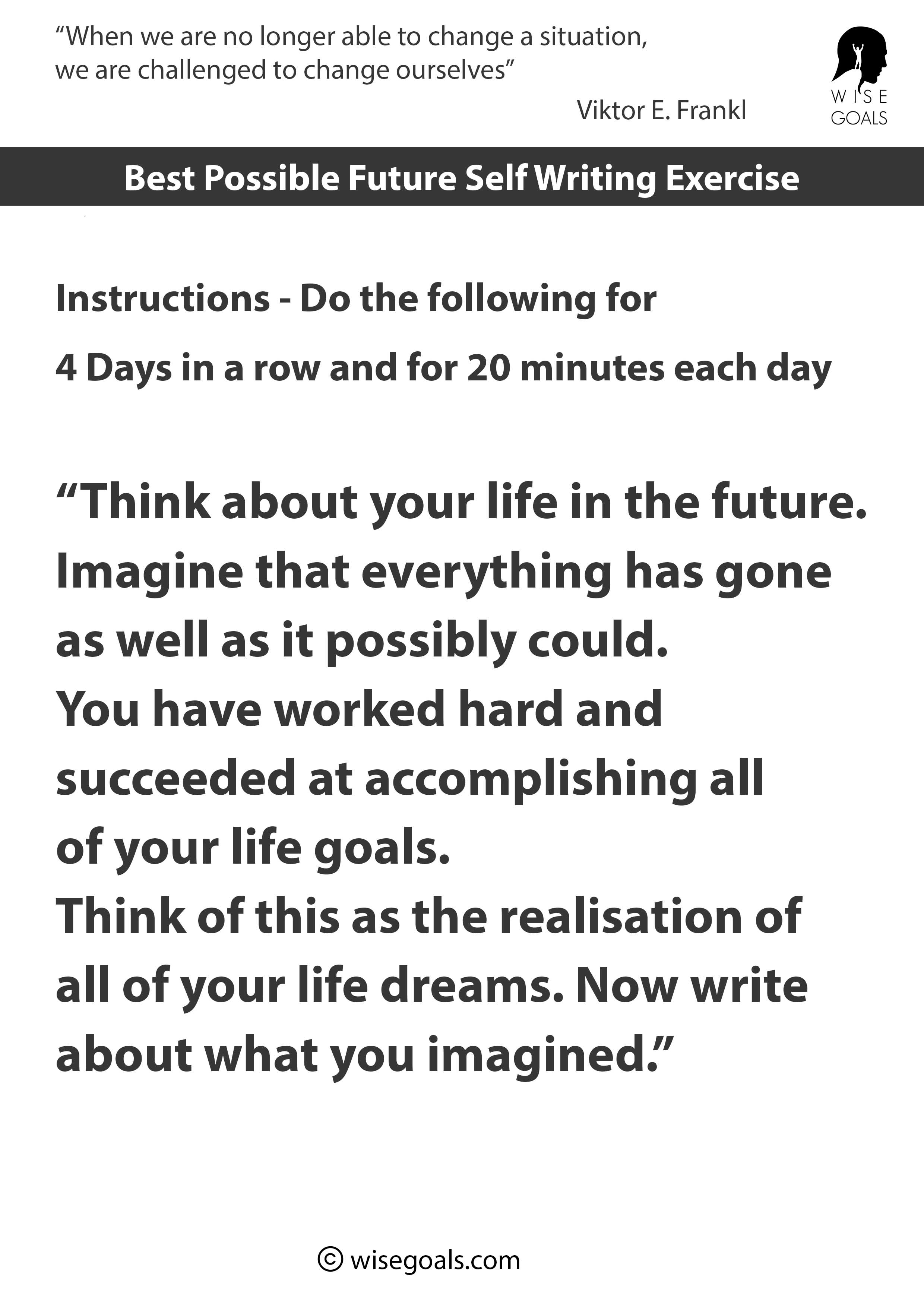- Home
- Goal Supporting Resources
- Best Future Self Exercise
The Best Possible Future Self Intervention: A Powerful Tool for Goal Setting
Goal setting is a fundamental aspect of personal development, yet many people struggle to articulate their aspirations and envision a path forward. One effective method for overcoming these challenges is the Best Possible Future Self (BPFS) intervention.
This intervention helps individuals tap into their imagination, clarify their values, and create a vivid picture of their ideal future. Here’s a closer look at how the BPFS can significantly enhance your goal-setting journey.

What is the Best Possible Future Self Intervention?
The Best Possible Future Self intervention involves envisioning a future where you have achieved your goals and are living your best life.
This exercise typically includes a guided reflection or writing exercise that prompts individuals to articulate what their ideal future looks like, focusing on various life domains such as career, relationships, health, and personal growth.
By vividly imagining this future, individuals can cultivate motivation and clarity about their goals.
Why It Works
- Enhanced Motivation: Visualizing a positive future can boost intrinsic motivation. When you see the potential rewards of your efforts, you’re more likely to stay committed to your goals.
- Clarity of Values: The BPFS intervention encourages deep reflection on what truly matters to you. Understanding your core values can help you set goals that resonate with your authentic self, leading to more meaningful pursuits.
- Emotional Connection: Envisioning your best possible self creates an emotional connection to your goals. This emotional engagement can drive you to take action and persist through challenges.
- Overcoming Obstacles: When you identify your best future self, you also become more aware of the obstacles that stand in your way. This awareness allows you to strategize and develop solutions to overcome these barriers.
How to Implement the BPFS Intervention
- Find a Quiet Space: Set aside time in a comfortable environment where you can focus without distractions.
- Guided Visualization: Take a few minutes to close your eyes and visualize your best possible future. Imagine what your life looks like in vivid detail. Consider aspects such as your career, relationships, health, and hobbies.
- Journaling Exercise: After your visualization, write a detailed description of your best possible future self. Include specific goals, feelings, and experiences. This written account serves as a powerful reminder of what you’re striving for.
- Set SMART Goals: Use the insights from your BPFS exercise to create specific, measurable, achievable, relevant, and time-bound (SMART) goals that align with your vision.
- Review Regularly: Revisit your best possible future self regularly to stay connected to your vision. This practice can help you stay motivated and adjust your goals as needed.
Written Instructions for Best Possible Self Intervention (4 days, 20 minutes each)
“Think about your life in the future. Imagine that everything has gone as well as it possibly could. You have worked hard and succeeded at accomplishing all of your life goals. Think of this as the realisation of all of your life dreams. Now write about what you imagined.”
You can view the original study here.

A similar free-writing intervention - Intensely positive experience
The intensely positive experience intervention, by the same researchers as those who tested the best possible self intervention, asked people to write about an intensely positive experience from the past, and yeah, same great results were found… improved mood, fewer health visits, less illness.
The instructions said that the experience can include anything that embodies a powerful positive emotion like awe, happiness, or ecstasy. Experiences might be about family, children, vacation, graduation etc).
If you're interested in finding out more, the original paper is a fascinating read.
Instructions for intensely positive experience intervention (3 days, 20 mins per day)
“Think of the most wonderful experience or experiences in your life, happiest moments, ecstatic moments, moments of rapture, perhaps from being in love, or from listening to music, or suddenly ‘‘being hit’’ by a book or painting or from some great creative moment. Choose one such experience or moment. Try to imagine yourself in that moment, including all the feelings and emotions associated with the experience. Now write about the experience in as much detail as possible trying to include the feelings, thoughts, and emotions that were present at the time. Please try your best to re-experience the emotions involved”
Where the best possible self intervention came from
The best possible self intervention came about thanks in part to research in the 80s by social psychologist, James Pennebacker, who tested the benefits of people writing about an event that was emotionally challenging or traumatic.
Participants were told to write for 15 to 20 minutes for three days in a row. Either:
- Writing about an emotionally difficult incident (3 days for 15-20mins)
- Writing about only the positive aspects of a traumatic incident (3 days for 15-20mins)
- Writing about a made-up traumatic incident (3 days - 15-20mins)
The results were really interesting… they found differences in health i.e. less health problems (Pennebaker & Beall, 1986) and they also found that people’s immune systems became stronger (Pennebaker, Kiecolt-Glaser, & Glaser, 1988).
Instructions for Traumatic Event Writing Exercise
“For the next three days, I would like for you to write about your very deepest thoughts and feelings about an extremely important emotional issue that has affected you and your life. In your writing, I’d like you to really let go and explore your very deepest emotions and thoughts. You might tie your topic to your relationships with others, including parents, lovers, friends, or relatives; to your past, your present, or your future; or to who you have been, who you would like to be, or who you are now. You may write about the same general issues or experiences on all days of writing, or on different topics each day. All of your writing will be completely confidential. Don’t worry about spelling, sentence structure or grammar. The only rule is that once you begin writing, continue to do so until your time is up.”
How does the best possible self exercise compare to these others
Interestingly, whether writing about a trauma, a hypothetical trauma, the positive aspects of a trauma, an intense and positive experience, or doing the best possible self intervention, the results were similar...
Improvements in wellbeing, life satisfaction, and some kind of achievement compared to control groups. So you can choose the one that feels best for you right now and go with that.
One quick point about the trauma writing exercises...
Researchers found a slight initial reduction in wellbeing on the day of writing and the next day, and then a gradual increase over time which was still present 6 months later. So that's something to be aware of if you try one.

One other finding was that compared to a control group, people who wrote about a difficult event found a job more quickly after being let go (Spera, Buhrfeind, & Pennebaker, 1994)... Pretty amazing!
Why do you think these writing exercises work?
Researchers thought about this a lot. There are a few theories knocking around...
In terms of the earlier trauma writing studies, some thought maybe it’s cathartic to talk about such events in detail.
There’s this idea that when stuff doesn’t get shared it’s stored as a kind of pent-up energy which is like a stress on the body and weakens the immune system, and with these writing exercises there is a release that happens.
I wonder if it's possible that un-spoken, unmaterialised hopes and dreams could have a similar impact, explaining one reason for the positive impact of the best possible self intervention.
Some really interesting studies tested variations of the trauma exercise to see if it provided any new insights. In one study they decided to get people to write about a traumatic event but one that was made up… (clever curious researchers eh!) and they found similar positive results (Greenberg, Wortman, and Stone, 1996).
Could be good news for someone who doesn’t fancy writing about their trauma. There was another study where people wrote only about the positive aspects of a traumatic experience, and they again found the same health improvements. (King and Miner, 2000).
Another theory was that it works because of people making sense of things. So, when people write for 15-20 minutes, within that process, there’s a growing sense of complex causes and consequences, and this can create insights.
This might include for example a clearer understanding of negative emotions and positive emotions related to events. (Pennebaker, 1993).
One other connected idea is that writing might create more self-regulation… This is the ability to understand and manage behaviour. This is one bit that seems especially interesting to me because managing myself and making progress toward my goals feel like they have a strong connection.
Conclusion
The Best Possible Future Self intervention is more than just a creative exercise; it’s a powerful strategy that can transform your approach to goal setting. By tapping into your imagination and envisioning your ideal future, you can cultivate the motivation, clarity, and resilience needed to pursue your aspirations.
Incorporate this intervention into your goal-setting routine, and watch as it unlocks new possibilities for your personal growth.
References
Greenberg, M. A., Wortman, C. B., & Stone, A. A. (1996). Emotional expression and physical health: Revising traumatic memories or fostering self-regulation? Journal of Personality and Social Psychology, 71, 588-602. Available at: Semantic Scholar
King, L. A., & Miner, K. N. (2000). Writing about the perceived benefits of traumatic events: Implications for physical health. Personality and Social Psychology Bulletin. Available at: Sage Journals
Pennebaker, J.W. (1993). Putting stress into words: Health, linguistic, and therapeutic implications. Behaviour Research and Therapy, 31, 539-548. Available at: Elselvier
Pennebaker, J.W., & Beall, S. (1986). Confronting a traumatic event: Toward an understanding of inhibition and disease. Journal of Abnormal Psychology, 95, 274-281. Available at: APA PsycNet
Pennebaker, J.W., Kiecolt-Glaser, J. K.,&Glaser, R. (1988). Disclosure of traumas and immune function: Health implications for psychotherapy. Journal of Consulting and Clinical Psychology, 56, 239-245. Available at: APA PsycNet
Spera, S. P., Buhrfeind, E. D., & Pennebaker, J.W. (1994). Expressive writing and coping with job loss. Academy of Management Journal, 37, 722-733. Available at: Academy of Management
- Home
- Goal Supporting Resources
- Best Future Self Exercise
Who I'm Affiliated With
I'm proud to be part of professional networks that value evidence-based practice, inclusion, and social impact.






